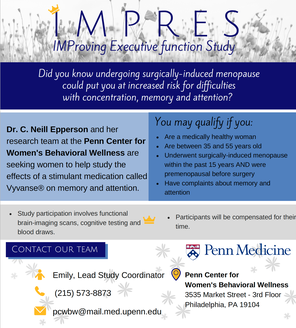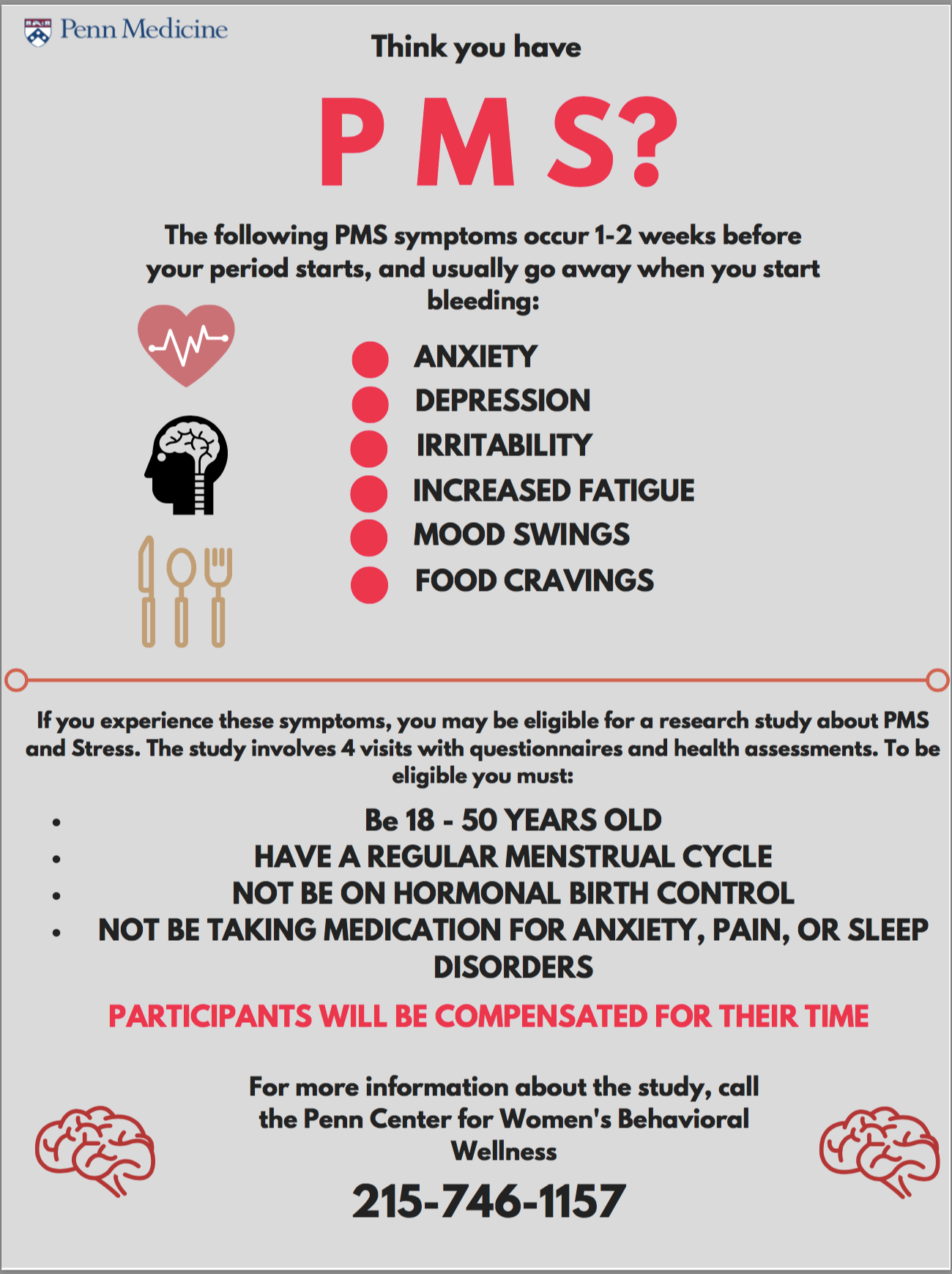Clincal Research at the PCWBW
The Penn Center for Women's Behavioral Wellness offers opportunities to participate in research studies focusing on:
- postpartum/antepartum depression and anxiety,
- hormone effects on the brain during pregnancy,
- pregnancy loss and complications,
- severe premenstrual syndrome, commonly known as premenstrual dysphoric disorder,
- cigarette smoking and its effects on mood, and
- hormone effects on memory and mood during the menopause.
The projects below are opportunities for you to volunteer and be a part of our research on behavioral health in women. For a broader listing of clinical research volunteer opportunities both at the University of Pennsylvania and beyond, access iConnect (Penn) and clinicaltrials.gov

Did you know undergoing surgically-induced menopause could put you at risk for difficulties with contentration, memory and attention?
Dr. C. Neill Epperson and her research team at the Penn Center for Women's Behavioral Wellness are seeking women to help study the effects of a stimulant medication called Vyvanse® on memory and attention.
You may qualify if you:
- Are a medically healthy woman
- Are between 35 and 55 years old
- Underwent surgically-induced menopause within the past 15 years AND were premenopausal before surgery
- Have complaints about memory and attention
- Study participation involves functional brain-imagining scans, cognitive testing and blood draws.
- Participants will be compensated for their time.
Contact our team
Emily, Lead Study Coordinator
215-573-8873
pcwbw@mail.med.upenn.edu
Penn Center for Women's Behavioral Wellness
3535 Market Street - 3rd Floor
Philadelphia, PA 19104
This study, funded by the National Institutes of Mental Health, aims to determine whether a new psychotherapy treatment for partial or mild Post-Traumatic Stress Disorder can help to alleviate PTSD symptoms, or accompanying depressive symptoms, in pregnant women.
We are looking for both pregnant women who have experienced difficult life events and pregnant women who have not had such experiences.
Eligible women must be:
- Over 18 years old,
- Fluent in spoken and written English
- Between 12-20 weeks pregnant
This study consists of up to 7 visits, which will take place at the Helen O. Dickens Center at the Hospital of the University of Pennsylvania. You will receive 4 sessions of individual treatment with a study therapist. Additionally, you will be asked to fill out forms about your physical and mental health, undergo 3 tests to measure your stress response, and have your blood and saliva collected 3 times.
All treatments are provided free of charge. If you complete all 7 visits, you may be compensated up to $260 for your time and travel to the study.
Women without trauma-related or depressive symptoms will be invited to participate in a one time assessment, which includes a stress test, filling out forms about physical and mental health, and having your blood and saliva collected. If you complete this one time assessment you may be compensated up to $50.
Please call RACHEL today for more information at 215-746-1490.
This study examines how effective the sex hormone progesterone is at reducing cigarette smoking and cigarette cravings.
If you are a smoker, you may be eligible to participate in a research study that uses brain imaging scans to study the effects of hormones on nicotine cravings. Eligible subjects will undergo brain imaging scans, have blood drawn, take the hormone progesterone for 3 days, stop smoking for up to 3 days, and complete questionnaires about their mood. Compensation is available.
You may qualify for this study if you:
- Are between the ages of 18-50
- Are in good physical health
- Do not use illicit drugs (marijuana is permissible)
- Do not drink more than 2 alcoholic beverages per day
- Do not take any medications for depression, anxiety, or other mental health problems
- Do not have any metallic implants in your body (this includes dental braces, shrapnel, rods etc.)
If you meet these criteria, please call ALEX for more information 215-573-8880 or complete an online survey to see if you would be eligible.
In a new research effort, the Stress & Premenstrual Symptoms Study, we are interested in learning how stress response differs between men and women. Our team of researchers and clinicians is interested in how stress might affect certain health and psychological measures in men and women, and are also interested in how changes across a woman’s menstrual cycle may affect how she responds to stress. We also want to learn more about stress response in women who have premenstrual syndrome (PMS) or premenstrual dysphoric disorder (PMDD).
You may be able to help us with this important research. We are looking for women and men, aged 18-50, to participate in this study and help advance knowledge about stress and health. We are looking for healthy men, women who do not experience premenstrual symptoms, as well as women who experience bothersome premenstrual symptoms. For this study, you will be asked to fill out forms about your physical and mental health, have blood and saliva samples taken, and undergo a test that will measure your stress responses. This includes 4 visits over the course of about 4 months. Compensation will be provided for your time. To be eligible, you cannot be taking hormones (e.g. hormonal contraceptives) or using psychoactive medications (e.g. antidepressants), and women must be experiencing regular menstrual cycles.
Please call JOANNA at 215-746-1157 for more information.

Have you ever wondered how gender-affirming hormone therapy can affect thinking, behavior, and functioning? If you identify anywhere on the female-to-male/masculine (FTM) spectrum (e.g., transgender men, transmasculine individuals) you may be eligible to participate in a research study that uses brain imaging scans to study the effects of testosterone on the brain. In order to participate, you must be between the ages of 18-45, have not yet begun transmasculinizing gender-affirming hormone therapy, and either: (a) plan to start soon with your medical provider, OR (b) do not plan to start within the next few months. Eligible subjects will undergo brain imaging scans, have blood drawn, complete thinking and memory tasks, and answer questions about their mood. Compensation is available.
Please call Penn PROMOTES Research on Sex and Gender in Health today at 215-573-6337 for further information.

